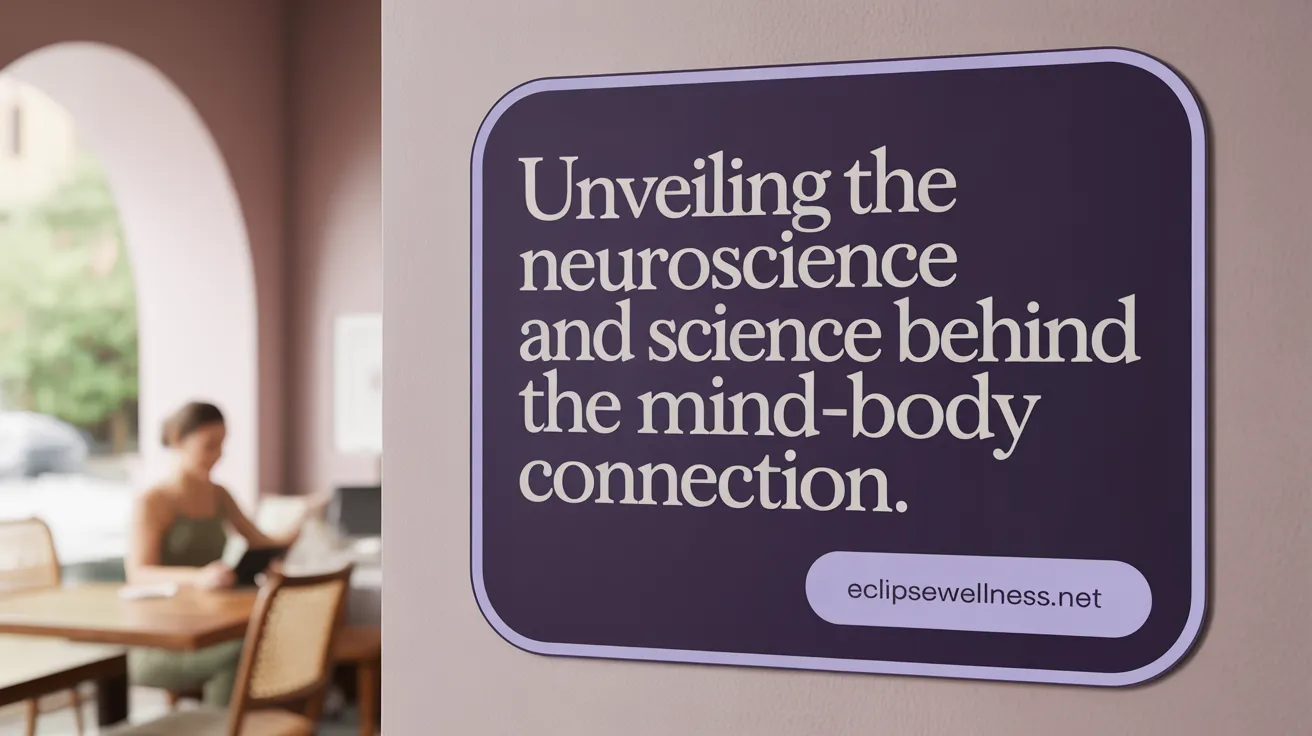Introduction to the Mind-Body Connection
Defining the Mind-Body Connection
The mind-body connection refers to the intricate relationship between our mental and emotional states and our physical health. It highlights how thoughts, feelings, and attitudes have the power to influence bodily functions and overall well-being.
Historical and Scientific Perspectives
Ancient cultures like those in Greece and China recognized the deep interconnection between mind and body, with concepts such as Qi emphasizing energy flow and balance. Philosophers like Plato and Descartes also explored how mental and physical realms interact. Modern science has confirmed these links through fields like neuroscience and psychoneuroimmunology, showing that emotions and thoughts impact hormone levels, immune responses, and brain activity. For instance, chronic stress activates stress hormones like cortisol, which can harm cardiovascular health and weaken immunity.
The Impact on Physical Health
Mental and emotional health deeply affect physical wellness. Positive mental states and practices such as mindfulness and meditation can enhance immune function and reduce inflammation. Conversely, negative emotions and sustained stress can contribute to headaches, digestive issues, sleep disturbances, and chronic diseases.
Understanding the mind-body connection encourages a holistic view of health that integrates emotional, mental, and physical care to foster true well-being.
Scientific Foundations of the Mind-Body Link in Health

Neuroscientific and Psychoneuroimmunology Insights
Modern neuroscience and psychoneuroimmunology mechanisms have scientifically validated the profound interaction between mental/emotional states and physical health. Brain imaging technologies like fMRI and PET scans reveal how emotional and cognitive processes regulate functions such as immune response, hormone secretion, and autonomic nervous system activity (Mind-body therapies, Neurological Evidence of a Mind-Body Connection).
How Emotions Influence Immune, Endocrine, and Nervous System Functions
Emotions exert powerful effects on bodily systems. Positive emotional states strengthen immunity and promote hormonal balance, while negative emotions and chronic stress suppress immune function and dysregulate endocrine activity, increasing vulnerability to illness (Emotions and immune function, mind-body connection).
Effects of Chronic Stress and Cortisol on Physical Health
Sustained stress triggers the 'fight-or-flight response' response, elevating cortisol and adrenaline levels. Chronic elevations of these stress hormones contribute to heart disease, weakened immune defense, inflammatory disorders, and mood disturbances by altering physiological set points (Stress and fight-or-flight response, Impact of cortisol on health, Effects of chronic stress on immune system.
Neural Mechanisms Behind Pain Perception and Neuroplasticity
Pain is modulated not just by tissue injury but by brain networks involving emotion, cognition, and sensory processing. Mindfulness and meditation foster neuroplastic changes, including increased cortical thickness in pain-regulating areas, which help reduce pain sensitivity and support emotional regulation (Neural mechanisms of pain perception, Neuroplasticity in pain regulation, mindfulness and pain management).
Benefits of Mindfulness and Meditation on Brain Structure and Function
Regular mindfulness practices enhance brain regions associated with attention control, emotional regulation, and self-awareness. These changes reduce stress hormone release, improve immune function, and promote healthier thought patterns, thereby supporting both mental and physical health (Meditation and mindfulness benefits, Mindfulness meditation effects).
In sum, integrative mind-body research elucidates the biological pathways through which mental states shape health outcomes. Mind-body practices harness these mechanisms to restore balance and promote lasting well-being (Understanding the Mind-Body Connection).
Mind-Body Practices: Techniques and Therapies Promoting Healing

What are common mind-body therapies and how do they promote healing?
Mind-body therapies encompass a range of practices that integrate physical movement, mindfulness, and mental focus to foster health. Popular therapies include yoga, acupuncture, meditation, tai chi, and biofeedback. These methods work by enhancing the interaction between the mind, brain, and body to regulate physiological functions.
Yoga and tai chi combine movement, breath control, and meditation to improve flexibility, balance, and emotional regulation. Acupuncture stimulates specific points to rebalance vital energy and alleviate stress and pain. Meditation uses focused attention and mindfulness to calm the nervous system and enhance emotional well-being. Biofeedback teaches individuals to control involuntary bodily processes such as heart rate and muscle tension, promoting relaxation and reducing symptoms.
How do mind-body practices reduce stress, inflammation, and pain?
Chronic stress activates the fight-or-flight response, increasing the release of stress hormones like cortisol, which can contribute to inflammation, immune suppression, and heightened pain sensitivity. Mind-body therapies help reduce stress by eliciting the relaxation response—lowering cortisol and sympathetic nervous system activity (Stress and fight-or-flight response.
These practices have been shown to decrease inflammatory markers, improve hormonal balance, and reduce muscle tension. Meditation and mindfulness techniques support emotional resilience and pain modulation by altering brain activity in regions related to pain perception and emotional regulation (Mindfulness and pain management).
What therapeutic benefits do these practices offer in chronic pain, mental health disorders, and addiction recovery?
Mind-body techniques have demonstrated benefits in managing chronic pain conditions such as low-back pain, fibromyalgia, and osteoarthritis by reducing pain intensity and improving function (Mind and Body Approaches for Chronic Pain). They also alleviate symptoms of mental health disorders, including anxiety, depression, and PTSD, by fostering emotional regulation and stress reduction (Mind-Body Therapies).
In addiction recovery, these therapies assist with coping by reducing cravings, stress, and emotional triggers. Yoga, acupuncture, and mindfulness-based interventions complement traditional treatments by improving emotional stability and supporting physical health (Mind-body medicine in addiction recovery).
What safety considerations and integration approaches exist?
When performed by qualified practitioners, mind-body therapies are generally safe (Safety of mind and body practices). Patients should consult healthcare providers to ensure suitability, especially when underlying medical conditions are present. Integration with conventional care enhances holistic outcomes, emphasizing personalized approaches tailored to individual needs (Holistic Healing).
Employing mind-body practices within multidisciplinary care teams fosters collaboration between medical, mental health, and holistic providers, ensuring safe, effective, and patient-centered healing journeys (Integrative Mental Health).
The Mind-Body Connection in Addiction Recovery and Trauma Healing

How are addiction, brain chemistry, and mind-body health connected?
Addiction profoundly affects brain chemistry, altering neurotransmitters like dopamine and serotonin, which influence mood, reward, and motivation. This disruption links mental health challenges such as anxiety and depression with physical symptoms including muscle tension, headaches, and digestive issues. The interconnectedness of mental and physical health means that addiction’s impact extends beyond the brain to the whole body, influencing overall well-being. Learn more about the mind-body connection in addiction recovery and mind-body connection.
What role do mindfulness, meditation, yoga, and acupuncture play in recovery?
Mind-body techniques are cornerstones of holistic recovery. Mindfulness and meditation enhance emotional regulation and stress management, reducing cravings and relapse risk. They foster awareness of triggers without judgment, allowing individuals to respond thoughtfully rather than reactively.
Yoga integrates physical movement with breath and mindful focus, promoting emotional resilience and easing withdrawal symptoms. Acupuncture supports stress reduction and physical balance by restoring energy flow, which can alleviate anxiety and cravings during recovery. These approaches are detailed in Mind-body medicine in addiction recovery and Holistic healing integrating mind, body, and spirit in recovery.
How does childhood trauma affect the mind-body connection?
Adverse childhood experiences (ACEs), such as abuse or neglect, disrupt the mind-body link by embedding trauma in both physiological responses and emotional patterns. Unprocessed trauma may cause persistent physical symptoms like muscle tension and headaches alongside mental health difficulties. These lasting imprints can increase susceptibility to addiction and complicate recovery if not addressed holistically. Explore how recovery from trauma impacts the mind-body connection.
How do somatic and trauma-informed therapies support healing?
Somatic therapies focus on bodily awareness to reveal and release stored trauma. Techniques like Somatic Experiencing and EMDR therapy basics help reprogram the nervous system’s fight-or-flight responses, fostering a sense of safety and integration.
Trauma-informed approaches, including trauma-sensitive yoga and grounding exercises, facilitate present-moment awareness without overwhelm, promoting healing through gentle reconnection with the body. These therapies complement talk therapy by engaging both physiological and psychological dimensions, supporting sustainable recovery and resilience. For more, see Somatic therapy and the mind-body connection and Mind-body integration and trauma-informed care.
Together, these mind-body strategies underscore the importance of addressing addiction and trauma through an integrative lens that honors the inseparable connection of mind and body. For a comprehensive overview, visit Understanding the Mind-Body Connection: A Comprehensive Guide.
Holistic and Integrative Approaches Enhancing Mind-Body Wellness

Integrating Physical, Mental, Emotional, and Spiritual Health
Holistic and integrative approaches recognize that health is more than the absence of illness; it involves nurturing the interconnected dimensions of body, mind, emotions, and spirit. This complete view fosters balance and promotes resilience, helping individuals address root causes rather than just symptoms. Incorporating practices such as meditation, yoga, and mindful breathing supports this interconnection and facilitates healing across all domains.
Importance of Personalized, Whole-Person Treatment Plans
Every individual’s mind-body connection profile is unique, requiring tailored interventions. Personalized treatment plans consider mental health, physical condition, lifestyle, trauma history, and spiritual needs—ensuring a whole-person approach. Such plans might integrate cognitive-behavioral therapy, acupuncture, nutrition counseling, and creative therapies like art or music therapy, which together promote recovery and well-being on multiple levels.
Role of Nutrition, Exercise, Stress Management, and Sleep Hygiene
Nutrition fuels brain chemistry and physical restoration, promoting mental clarity and emotional stability. Exercise, including yoga and tai chi, releases endorphins and reduces stress hormones, enhancing mood and physical health. Stress management via mindfulness practices and relaxation techniques reduces cortisol, which otherwise impairs immunity and healing. Quality sleep is essential for cognitive function and recovery, and proper sleep hygiene supports sustained mental and physical wellness.
Collaboration Among Healthcare Providers and Patient Education
Effective holistic care relies on collaborative partnerships between medical providers, mental health professionals, and complementary therapy practitioners. This teamwork ensures coordinated and integrative treatment addressing all health dimensions. Patient education empowers individuals with self-care strategies, fostering engagement and sustained health improvements. Understanding the mind-body connection encourages patients to actively participate in their healing journey, combining conventional and holistic methods for the best outcomes.
Mental Health’s Influence on Physical Healing and Rehabilitation

How does mental health affect pain perception, motivation, and healing speed?
Mental health plays a crucial role in physical healing and rehabilitation. Negative mental states such as stress, anxiety, and depression can heighten pain sensitivity and inflammation, slowing tissue repair and complicating recovery. In contrast, positive mental health fosters motivation and adherence to therapy, promoting faster and more effective healing. For more insights on the impact of mental health on healing, explore the connection between mental health and physical recovery.
What techniques support healing through mental health management?
Effective techniques include cognitive reframing, which helps patients shift negative thoughts about pain and progress into more empowering perspectives. Breathing exercises and guided relaxation reduce muscle tension and decrease stress hormones like cortisol, which can otherwise interfere with healing processes. These approaches improve emotional regulation, lessen pain perception, and support better physical outcomes. Learn about cognitive reframing for pain management and relaxation exercises to further understand these methods.
How do collaborative care models enhance rehabilitation?
Integrating mental health professionals with physical therapists ensures both physical and emotional aspects of recovery are addressed. Such collaborative care leads to faster recovery, reduced pain, and improved mobility. Patients benefit from coordinated strategies that consider psychological barriers alongside physical rehabilitation goals. Discover more about the collaborative approach in recovery and mental health strategies for faster healing.
What mindfulness and visualization strategies aid recovery?
Mindfulness practices promote non-judgmental awareness of present moment experiences, reducing anxiety and fear associated with injury. Visualization techniques, such as PETTLEP, involve mentally rehearsing successful recovery to boost emotional resilience and foster acceptance of healing processes. Together, these mind-body strategies create a supportive mental environment for improved rehabilitation outcomes. For detailed information, see resources on mindfulness for athletes, visualization techniques for recovery, and mind-body therapies.
Mental and physical health are deeply interconnected; addressing both with compassionate, patient-centered strategies can significantly enhance healing and long-term wellness. For a comprehensive understanding of this mind-body connection, explore the holistic relationship between emotional and physical health.
